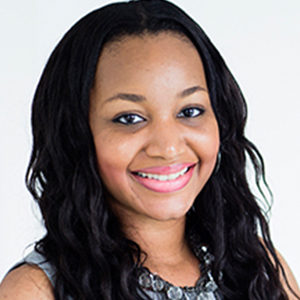The Changing Face of the Legal Profession: Valerie Johnson | Copeley Johnson & Groninger PLLC
Ready or not, change is here. For lawyers, these changes affect every aspect of who they are and what they do. Over the next few weeks, we’ll be running a blog series entitled: “The Changing Face of the Profession.” We’ll be chatting with legal professionals about the changes in the practice of law and what it means for the future of the profession. This week we’re talking to Valerie Johnson, Partner at Copeley Johnson Groninger PLLC and Lawyers Mutual Board Member.
LM: As an African American and a woman in the legal profession, what efforts do you see being made in the industry when it comes to embracing diversity and inclusion?
VJ: It is a job for all of us to make sure that we have a diverse environment. Diversity is good for business, so changes are good for the bottom line. What client doesn’t like that there are people like her in a firm that she has chosen to work for her? A firm that doesn’t recognize that won’t be responding to the new playing field.
Today I spent a large part of my day watching two of our associates try a civil case in superior court; the lawyers, in that case, were three young women and a gay man. One was days away from the birth of her first child. The profession looks different than it did when I was fresh out of law school. There are many more women and many more minority attorneys. Larger firms are making diversity and inclusion programs, with targets and outreach to law schools in a way that was not widespread before.
But there are many more steps that can be made. It is easy for firms to drift toward tokenism without real effort toward inclusion. I have heard it said that diversity is being asked to the dance, and that inclusion is being asked to dance. And too few are being asked to dance. Even when a minority attorney is included, being the only one is hard in any setting. It is particularly difficult in the law, where the work is hard and the hours are long.
When I first made partner I remember looking at the diversity statistics. I found a headline that said that a milestone had been reached, and now one percent of partners in law firms were African-American. I was floored. There are now more, but many women and minority lawyers are not first chairs at trials and leading the litigation. We have a long way to go.
LM: It’s impossible to talk about the changes in the legal industry without mentioning technology. How has technology changed what it means to be competent in the legal profession?
VJ: Even in the last ten years, technology has drastically changed the legal industry. Technology has also eased our ability to manage our firms and enhanced our capabilities in putting on our case in the courtroom. With all of these advancements have come increased cost, a demand to keep pace with all of the options, and new ethical conundrums we could never have anticipated. I envision that competency in the legal profession will require at minimum that we are aware of the available options and hone them to ensure that we are the best advocates for our clients.
But technology has also meant that the business of law is more complicated. If you had told me years ago that I would spend time and resources on search engine optimization, I would have looked at you like you were crazy. We all know law firms who just use paper still, or who resist new programs. The numbers of those attorneys will continue to drop in the coming years. Years ago we couldn’t have known that clients would expect to text you and that we would need to know all about e-discovery to practice in certain areas. And the North Carolina State Bar has a requirement now to participate in CLE about technology.
LM: How do you feel the rapid changes in technology are going to affect legal education?
VJ: It is easier than ever to take technology everywhere so I hope that education will continue to venture into the real world of law. But in my UNC trial advocacy class, hands-on practice is still as important as technology. Mastering it can make your trial practice seamless, so it is crucial to teach.
Law often lags behind technology. But there are so many sources for information that students have to master. It is almost as if everything legal is at your fingertips, so discernment of the important and relevant is more important than ever before.
The rise of the Bots and artificial intelligence (AI) are exciting to see. I can’t wait to see how the mechanics and ethics are explored in law schools.
LM: How can attorneys use technology to bridge the generational gap in the profession?
VJ: Although members of the younger generations have been criticized for their lack of interpersonal skills, I actually think that technology encourages more communication and team building. Slack, Google Chat and Asana are just a few applications that facilitate the water cooler conversations.
LM: What is one thing you know now that you wish you had been taught in law school?
VJ: How to balance your trust account on a monthly basis.
Trust accounting is part of what I would have loved to know because the business of law is difficult to learn! Now that I have been part of running two law firms during the last 22 years, I know that I could have used more tools. We are so involved with learning the mechanics of the law that it is an afterthought that many of us will be running small businesses or larger ones. An appreciation for the business of practicing law should be important to everyone who is or wants to be in private practice.
Most of all I wish someone had told me how important mentorship was. I was lucky enough to land a job at a firm where I was actively taught and encouraged. Others aren’t given that chance. If you aren’t fortunate enough to have a built-in mentor, you’ll have to find one or more. You may find mentors who give insight into part of what you need, like networking, or resilience, or technology.
Having a mentor has helped me with what I believe is the most important factor in my success -- showing up. Showing up and doing a hard job in the best way I could, despite any fears I had, has made a difference in my career.
LM: Mental health and wellness seem to be a high priority in the profession right now. What changes can be made in the profession to ensure the well-being of legal professionals?
VJ: I applaud the efforts at getting lawyers more time off to care for themselves or for their families. We have to make time off an expected part of the profession. I know lawyers who take a month off at a time and even one or two who have taken a sabbatical. That should be the norm. But we have to resist the 24/7 siren call of technology to get there, and not expect instant responses.
The hard-driving lawyer who works all the time is still alive and well. But as younger lawyers take over, they are showing us ways to be healthy and mindful while getting the work done. I know a lawyer who teaches the other lawyers in the office yoga on Friday afternoons. Many lawyers, including me, have an active meditation or prayer practice. Yet law still requires tremendous effort, and some people need more intensive help. We need to lift the stigma on therapy and recovery programs.
Flexibility is key. I brought my then-toddler daughter to work with me some days and my work didn’t suffer for it. I knew I was ahead of the pack at the time. Now mothers and fathers can work at home because of technology. But it is important that they feel supported and not marginalized by family demands.
LM: Change is inevitable. Change is here. What ways can lawyers innovate and thrive in the coming months and years?
VJ: We are all learning that the must-haves and must-dos of the past may not be necessary. Lawyers can practice without a traditional office. They may use assistants from down the hall, or across the country. People are able to design their work lives in ways they could not before.
Specializing in a practice area is one way to stand out. Working in an even smaller niche -- think equine law or bicycle crashes -- gets other lawyers thinking about your practice when those calls come in. It is a way to stay excited about the law when you have an area you have studied and been successful in, and others come to you as an authority. My law partner focuses her practice on bicycle crashes because of her passion for cycling. I focus on workers’ compensation.
Focusing your practice in one area should not be a restriction, either. Because I do workers’ compensation, I can also focus on related areas, like personal injury and employment discrimination. Those clients who originally come in to see me about my specialty often have other problems that I can address.
LM: Speaking of thriving, can you tell us about your podcast, “Law Sisters.” What inspired you to launch the podcast?
VJ: In retrospect, it seems like a revolution was inevitable now about the ways that women are treated in the workplace. Many women who work have a story about how they were assaulted, harassed, or discriminated against because of their gender. More than that have multiple stories about how casually women can be dismissed or demeaned where they earn their living. We hear those stories nearly every day at the office.
The podcast grew out of my love for podcasting. My partner Leto Copeley was on board with the idea and came up with the excellent idea to talk about sexual harassment. I am fascinated by the new ways that we can disseminate information, and this seemed like a great way to talk about the law in a different manner. We started in the months before #MeToo and grew from there.
Podcasting is so accessible. You can start with a computer, some software, and a microphone. The public can have a portal into the law. Of course, that niche can be a draw into the podcast. Recently Ann Groninger, my partner in the Charlotte office, competed in a podcast contest with a podcast focused on bicycling in Charlotte.
LM: What do you feel is the biggest barrier when it comes to bridging the gap in the law office?
VJ: Everything starts with a good attitude, just like my mother told me. The more experienced we are, the easier it is to do everything the same way every time. It is efficient and easy, so why not use what we know? But sticking with the tried and true is often a missed opportunity when we think of bringing in new people and better ideas. So, we try to foster growth in our offices among everyone who works there. An attitude of growth and learning allows people to explore and be passionate about the practice areas and clients we serve. The most seasoned people in the office don’t necessarily have the most information about the latest technology, or the emerging nature of a problem. It is important to tap the expertise and experiences of the newer attorneys.
We have a built-in resistance to change in the legal profession. Many practitioners fear the changes coming to their practice, and it can be scary in small firms to confront those. But it can be rewarding to have new perspectives and new ideas from new people. That is a benefit to everyone - lawyers, paralegals, and most of all, the clients we serve.




